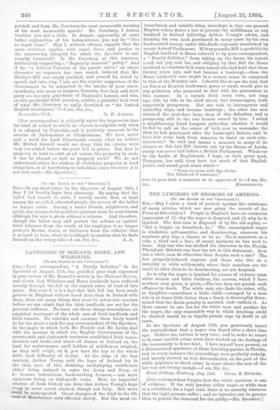priated, and from Mr. Courtney the most memorable warning of
his most memorable speech! Mr. Courtney, I notice, troubles you not a little. In despair, apparently, of some better explanation of his independence, you say he "likes to stand alone." May I, without offence, suggest that the same criticism applies with equal force and justice to the unswerving integrity for which the Spectator is uni- versally honoured ? Is Mr. Courtney, at this juncture, deliberately supporting a " flagrantly immoral " policy ? And if he, "a Liberal Unionist of the purest water," on whose character no reproach has ever rested, believed that Mr. Morley's Bill was amply justified, and proved his belief by speech and vote, why, I ask, are the regular supporters of the Government to be subjected to the insults of your corre- spondents, who seem to suppose, forsooth, that they and their party are the only guardians of England's honour, and who, on this particular Irish question, exhibit a plentiful lack even of what Mr. Courtney so aptly described as " the limited English intelligence " P—I am, Sir, &c., Devonshire Club. L. F. AUSTIN.
[Our correspondent is evidently under the impression that the kind of attack to which he objects is culpable only when it is adopted by Unionists, and is perfectly innocent in the mouths of Nationalists or Gladatonians. We have never said a word for Lord Clanricarde except, what we believe Mr. Morley himself would not deny, that his estates were very low-rented before the great fall in prices. But how is property in land to exist at all unless, like property in cash, it can be abused as well as properly used ? We do not understand either the wisdom of abolishing property in land altogether, or of interfering in individual cases wherever it is not well used.—En. Spectator.]
































 Previous page
Previous page